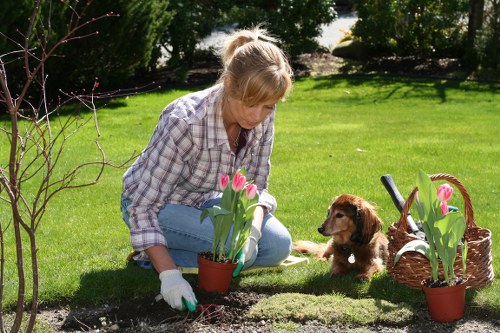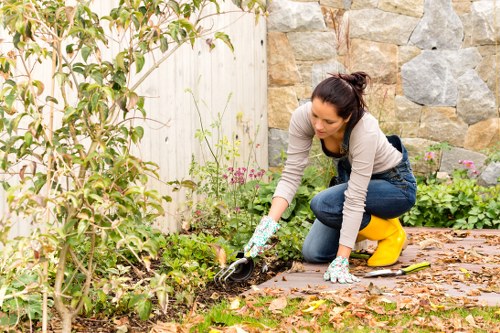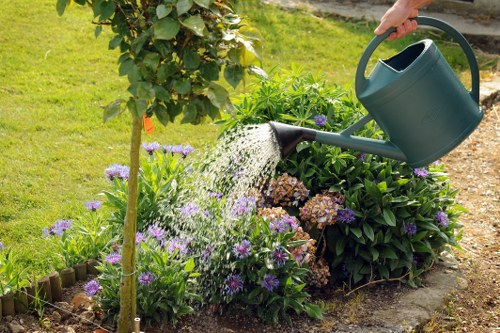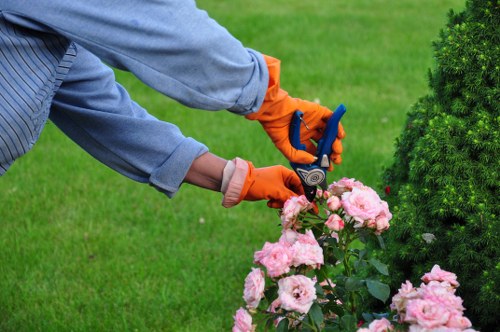Comprehensive Guide to Garden Maintenance in Erith
Introduction to Garden Maintenance

Maintaining a beautiful garden in Erith requires a blend of passion, knowledge, and the right techniques. Whether you're a seasoned gardener or a beginner, understanding the essentials of garden maintenance in Erith can transform your outdoor space into a vibrant and lush haven.
Erith's unique climate and soil conditions influence the types of plants that thrive here. Proper maintenance ensures that your garden remains healthy, aesthetically pleasing, and a source of joy throughout the year.
In this article, we'll explore various aspects of garden maintenance specific to Erith, providing you with actionable tips and insights to keep your garden in top shape.
Understanding Erith’s Climate and Soil

Erith experiences a temperate maritime climate, characterized by mild summers and cool winters. This climate is conducive to a wide range of plants, but it also presents specific challenges that gardeners must address through diligent maintenance.
The soil in Erith varies, but it's generally a mix of clay, sand, and silt. Understanding your garden's soil composition is crucial for selecting the right plants and determining the necessary soil amendments to enhance fertility and drainage.
Regular soil testing can help you identify nutrient deficiencies and pH imbalances, allowing you to adjust your garden care practices accordingly.
Essential Garden Maintenance Tasks

Effective garden maintenance involves a series of tasks that should be performed regularly to ensure the health and beauty of your plants. Here are some essential tasks to consider:
- Pruning and Trimming: Regular pruning helps maintain plant shape, promotes healthy growth, and prevents diseases.
- Weeding: Removing weeds is vital as they compete with your plants for nutrients, water, and light.
- Watering: Consistent and appropriate watering practices are essential, especially during dry spells.
- Fertilizing: Providing the right nutrients supports plant health and growth.
- Pest and Disease Control: Monitoring and managing pests and diseases helps protect your garden from potential damage.
Seasonal Garden Maintenance in Erith

Seasonal changes significantly impact garden maintenance routines. Adapting your practices to the seasons ensures that your garden remains resilient and vibrant throughout the year.
Spring Maintenance
Spring is the perfect time to prepare your garden for the growing season. Tasks include:
- Clearing debris and dead plants to make way for new growth.
- Planting spring bulbs and annuals.
- Applying compost or fertilizers to enrich the soil.
Summer Maintenance
During the summer, focus on:
- Consistent watering schedules, especially during dry periods.
- Mulching to retain soil moisture and suppress weeds.
- Regular pruning to manage plant growth and health.
Choosing the Right Plants for Erith Gardens

Selecting plants that are well-suited to Erith's climate and soil conditions is fundamental to successful garden maintenance. Consider the following when choosing your plants:
- Hardiness: Ensure the plants can withstand Erith's temperature ranges.
- Soil Compatibility: Match plants to your soil type, whether it's clay-heavy or sandy.
- Water Requirements: Choose plants with similar water needs to streamline your watering routine.
- Sunlight Exposure: Position plants according to their light preferences, be it full sun, partial shade, or full shade.
Popular choices for Erith gardens include perennials like lavender and geraniums, shrubs such as hydrangeas, and various fruit-bearing trees.
Soil Preparation and Fertilization

Healthy soil is the foundation of a thriving garden. Proper soil preparation involves:
- Testing Soil: Determine pH levels and nutrient content to tailor your soil amendments.
- Amending Soil: Add organic matter like compost or well-rotted manure to improve soil structure and fertility.
- Mulching: Apply mulch to conserve moisture, regulate soil temperature, and suppress weeds.
Fertilization Techniques
Fertilizing provides essential nutrients that promote plant growth. Consider the following:
- Organic Fertilizers: Such as bone meal, blood meal, or fish emulsion, which release nutrients slowly.
- Synthetic Fertilizers: Provide immediate nutrient availability but require careful application to prevent over-fertilization.
- Foliar Feeding: Spraying fertilizer directly onto plant leaves for quick nutrient uptake.
Watering Strategies for Erith Gardens

Efficient watering is crucial for maintaining healthy gardens. Implement these strategies to optimize water usage:
- Drip Irrigation: Delivers water directly to the plant roots, reducing evaporation and water waste.
- Rainwater Harvesting: Collecting rainwater can provide a sustainable water source for your garden.
- Watering Schedule: Water early in the morning or late in the evening to minimize evaporation.
Signs of Overwatering and Underwatering
Recognizing the signs of improper watering can prevent plant stress:
- Overwatering: Wilting despite wet soil, yellowing leaves, and root rot.
- Underwatering: Dry soil, crispy leaf edges, and stunted growth.
Pest and Disease Management

Protecting your garden from pests and diseases is an ongoing task. Effective management includes:
- Regular Monitoring: Inspect plants frequently for signs of pests or disease.
- Natural Remedies: Use organic treatments like neem oil or insecticidal soap to control pests.
- Removing Infected Plants: Dispose of diseased plants to prevent the spread of pathogens.
Integrated Pest Management (IPM)
IPM combines various strategies to manage pests sustainably:
- Biological Control: Introduce beneficial insects that prey on harmful pests.
- Cultural Practices: Implement crop rotation and remove plant debris to reduce pest habitats.
- Chemical Control: Use pesticides as a last resort, opting for targeted applications to minimize environmental impact.
Pruning and Trimming Techniques

Proper pruning and trimming are essential for maintaining plant health and aesthetics. Follow these techniques:
- Sanitize Tools: Clean your pruning tools to prevent the spread of diseases.
- Prune at the Right Time: Different plants have optimal pruning seasons for best results.
- Remove Dead or Diseased Branches: Enhances plant vitality and appearance.
Types of Pruning
Understand the various pruning methods to apply them effectively:
- Thinning: Removes entire branches to improve air circulation and light penetration.
- Heading: Cuts back branches to a bud or lateral branch to encourage bushier growth.
- Deadheading: Removes spent flowers to promote further blooming.
Lawn Care and Maintenance

A well-maintained lawn enhances the overall look of your garden. Key lawn maintenance practices include:
- Mowing: Keep grass at an optimal height to promote healthy growth and prevent weeds.
- Fertilizing: Apply appropriate fertilizers to nourish the lawn.
- Aerating: Improve soil compaction and enhance root development.
Dealing with Lawn Pests
Common lawn pests in Erith can be managed through:
- Biological Controls: Introducing natural predators like ladybugs.
- Chemical Treatments: Using targeted pesticides when necessary.
- Regular Maintenance: Keeping the lawn healthy to naturally resist pests.
Mulching for Garden Health

Mulching is a fundamental practice in garden maintenance. It offers several benefits:
- Moisture Retention: Helps maintain consistent soil moisture levels.
- Weed Suppression: Reduces the growth of unwanted plants.
- Soil Temperature Regulation: Keeps the soil cooler in summer and warmer in winter.
Types of Mulch
Choose the right mulch based on your garden needs:
- Organic Mulch: Includes wood chips, straw, and compost, which enrich the soil as they decompose.
- Inorganic Mulch: Such as gravel or plastic, which do not decompose but require less maintenance.
- Living Mulch: Planting ground covers that serve the same functions as traditional mulch.
Weed Management Strategies

Weeds can quickly overtake a garden if not managed properly. Effective weed management includes:
- Manual Removal: Regularly pulling out weeds ensures they do not seed and spread.
- Mulching: As mentioned, mulch acts as a barrier to weed growth.
- Cultural Practices: Planting dense vegetation to outcompete weeds.
Preventative Measures
Implementing preventive measures can reduce weed problems:
- Pre-emergent Herbicides: Apply before weed seeds germinate.
- Regular Monitoring: Early detection and removal prevent weeds from establishing.
- Proper Lawn Care: A healthy lawn resists weed invasion.
Composting and Soil Health

Composting is an eco-friendly way to recycle garden waste and improve soil health. Benefits include:
- Enriching Soil: Compost adds essential nutrients and organic matter.
- Improving Soil Structure: Enhances drainage and aeration.
- Reducing Waste: Minimizes the amount of organic waste sent to landfills.
How to Start Composting
Setting up a compost bin is straightforward:
- Choose a Location: Select a well-drained area with good airflow.
- Layer Materials: Alternate layers of green materials (kitchen scraps, grass clippings) and brown materials (dry leaves, branches).
- Maintain the Pile: Turn the compost regularly to aerate and speed up decomposition.
Irrigation Systems for Efficient Watering

Installing an irrigation system can streamline your watering routine and ensure consistent moisture levels. Consider these options:
- Drip Irrigation: Ideal for targeted watering of individual plants.
- Sprinkler Systems: Suitable for larger areas like lawns and vegetable gardens.
- Automatic Timers: Schedule watering times to optimize efficiency.
Benefits of Automated Systems
Automated irrigation systems offer several advantages:
- Time-Saving: Reduces the need for manual watering.
- Water Efficiency: Minimizes water waste through precise application.
- Consistent Moisture: Ensures plants receive adequate water, promoting healthy growth.
Landscape Design and Aesthetics

Thoughtful landscape design enhances the beauty and functionality of your garden. Key considerations include:
- Plant Selection: Choose a variety of plants that provide color, texture, and structure.
- Layout: Create pathways and focal points to guide movement and draw attention to key features.
- Seasonal Interest: Incorporate plants that offer visual appeal throughout different seasons.
Incorporating Hardscaping Elements
Adding hardscaping elements like patios, fences, and garden ornaments can complement your plantings:
- Patios and Walkways: Provide structure and accessibility.
- Fencing: Offers privacy and defines garden boundaries.
- Garden Ornaments: Enhance visual interest and reflect personal style.
Sustainable Gardening Practices

Adopting sustainable practices benefits both your garden and the environment. Consider the following:
- Rainwater Harvesting: Use collected rainwater for irrigation.
- Organic Gardening: Avoid synthetic chemicals and focus on natural fertilizers and pest controls.
- Biodiversity: Plant a variety of species to support local wildlife and create a resilient ecosystem.
Reducing Carbon Footprint
Implementing eco-friendly techniques can minimize your garden's environmental impact:
- Composting: Reduces organic waste and enriches soil.
- Native Plants: Require less water and are more resistant to local pests.
- Energy-Efficient Tools: Use manual or battery-powered tools instead of gas-powered equipment.
Tools and Equipment for Garden Maintenance

Having the right tools makes garden maintenance tasks easier and more efficient. Essential tools include:
- Pruners and Shears: For precise trimming and shaping.
- Garden Fork and Spade: Useful for digging and aerating soil.
- Watering Equipment: Such as hoses, sprinklers, and watering cans.
- Wheelbarrow: Helps transport materials around the garden.
Maintenance of Garden Tools
Proper care extends the lifespan of your tools:
- Cleaning: Remove dirt and debris after each use.
- Sharpening: Keep blades sharp for effective cutting.
- Storage: Store tools in a dry place to prevent rust and damage.
Dealing with Common Garden Challenges

Gardening in Erith comes with its own set of challenges. Addressing these issues proactively can help maintain a healthy garden:
- Pests: Implement integrated pest management strategies.
- Diseases: Use disease-resistant plant varieties and maintain good sanitation.
- Weather Extremes: Protect plants from unexpected frost or heavy rains with appropriate coverings and drainage solutions.
Recovering from Garden Setbacks
Even with careful maintenance, setbacks can occur. Steps to recover include:
- Assessing Damage: Identify the extent of plant loss or disease.
- Removing Affected Plants: Prevent the spread of diseases by disposing of compromised plants.
- Replanting: Restore your garden with healthy, suitable plants.
Hiring Professional Garden Maintenance Services

While DIY maintenance is rewarding, professional services can offer expertise and save you time. Benefits of hiring professionals include:
- Expert Knowledge: Professionals understand local climate and soil conditions.
- Time Efficiency: Saves you time to enjoy your garden rather than work on it.
- Comprehensive Care: Offers a full range of maintenance services tailored to your garden’s needs.
Choosing the Right Service Provider
When selecting a garden maintenance service in Erith, consider:
- Experience and Reputation: Look for providers with positive reviews and a strong track record.
- Services Offered: Ensure they offer the specific services you require.
- Cost and Value: Compare pricing structures and ensure you receive value for your investment.
Contact us today to learn more about our professional garden maintenance services in Erith and transform your outdoor space!
Creating a Year-Round Maintenance Schedule

Having a structured maintenance schedule ensures that all aspects of your garden receive attention in a timely manner. Here's a sample year-round schedule:
- Spring: Planting, soil preparation, pruning, and fertilizing.
- Summer: Watering, weeding, pest control, and mulching.
- Autumn: Leaf removal, composting, and preparing plants for winter.
- Winter: Protecting plants, planning for the next season, and tool maintenance.
Adapting to Seasonal Changes
Flexibility is key as weather patterns can vary. Adjust your schedule based on current conditions to ensure optimal garden health.
Enhancing Garden Health with Organic Practices

Organic gardening promotes sustainability and environmental health. Incorporate these practices for a thriving garden:
- Use Organic Fertilizers: Opt for compost and natural amendments instead of synthetic options.
- Natural Pest Control: Encourage beneficial insects and use organic treatments.
- Crop Rotation: Prevents soil depletion and reduces pest and disease buildup.
Benefits of Going Organic
Organic gardening offers numerous advantages:
- Healthier Soil: Enhances soil structure and microbial activity.
- Environmental Protection: Reduces chemical runoff and preserves local ecosystems.
- Safer for Wildlife: Creates a habitat conducive to beneficial insects and animals.
Maximizing Garden Productivity

For those interested in maximizing their garden's productivity, whether for ornamental or edible purposes, consider the following tips:
- Plant Selection: Choose high-yield and disease-resistant varieties.
- Succession Planting: Stagger planting times to ensure continuous harvests.
- Companion Planting: Grow complementary plants together to enhance growth and deter pests.
Efficient Harvesting Techniques
Proper harvesting ensures the longevity and productivity of your plants:
- Timely Harvest: Pick fruits and vegetables at peak ripeness for the best quality.
- Proper Tools: Use sharp, clean tools to make clean cuts and reduce plant stress.
- Post-Harvest Care: Store produce correctly to maintain freshness and prevent spoilage.
Book your service now to enhance your garden's productivity with our expert maintenance techniques!
Conclusion: Achieving a Beautiful Garden in Erith

Maintaining a garden in Erith is a rewarding endeavor that requires dedication and the right approach. By understanding the local climate and soil, performing essential maintenance tasks, and adopting sustainable practices, you can cultivate a garden that is both beautiful and healthy.
Whether you choose to embark on this journey yourself or seek professional assistance, the key to a thriving garden lies in consistent care and informed decisions.
Embrace these garden maintenance strategies to transform your outdoor space into a lush sanctuary that brings joy and tranquility all year round.
Contact us today to start your journey towards a stunning and well-maintained garden in Erith!